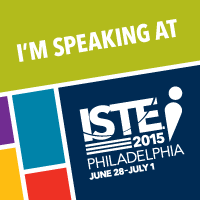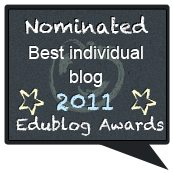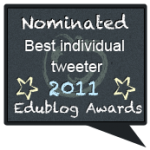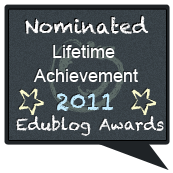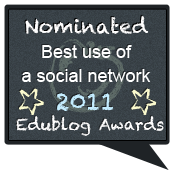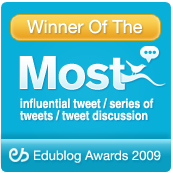 This year I made a few changes to my WordPress Blog site. I removed all of the ads that WordPress placed on it and I now use my name as the domain name to more easily traffic readers to the site. As I did these things at a minimal cost, I questioned whether or not it was worth the effort. I questioned if any of the time, effort or money that I have committed, and continue to put in to all of this, is really worth it. Does the average person even know or understand what a blog is? Do professionals understand how blogs influence their profession? Are teachers using blogs as both relevant reading and writing tools? Are students using blogs to create their voice? Do people in general see any importance in blogging to reflect, question, criticize, or improve the world in which we live? Do blogs have a value in our world today that is at least understood, if not appreciated, by those who should? Does the access to blogs require too much tech savvy, critical thinking, and a mindset different from the 20th Century to prevent the acceptance of blogs as a change force in our 21st Century world? Will a large enough group of people even read this post to make a difference or will people need to print it out to share copies with others?
This year I made a few changes to my WordPress Blog site. I removed all of the ads that WordPress placed on it and I now use my name as the domain name to more easily traffic readers to the site. As I did these things at a minimal cost, I questioned whether or not it was worth the effort. I questioned if any of the time, effort or money that I have committed, and continue to put in to all of this, is really worth it. Does the average person even know or understand what a blog is? Do professionals understand how blogs influence their profession? Are teachers using blogs as both relevant reading and writing tools? Are students using blogs to create their voice? Do people in general see any importance in blogging to reflect, question, criticize, or improve the world in which we live? Do blogs have a value in our world today that is at least understood, if not appreciated, by those who should? Does the access to blogs require too much tech savvy, critical thinking, and a mindset different from the 20th Century to prevent the acceptance of blogs as a change force in our 21st Century world? Will a large enough group of people even read this post to make a difference or will people need to print it out to share copies with others?
As a professional:
Since Blog posts require a little bit of “tech savvy”, I think many of today’s educators who blog are members of the larger connected community of educators. That community is collaborative through social media, and often those digital connections carry over to more face-to-face collaborations at education conferences and meet-ups. These connected communities represent many of the education thought leaders and authors guiding the direction of education today. Bloggers interact with educators digitally as well as their real world colleagues daily. Their reflections often mirror these interactions in their blog posts. The musings and conversations of the connected community often precede the faculty room and faculty meeting conversations taking place in schools by months. Of course the mainstream media often picks things up after they have been implemented. All of this gives Blog posts a relevance that is not seen in print media.
Blogs are interactive and relevant. Teachers have an opportunity to comment and interact with the authors and thought leaders giving them voice in the direction that education will take. In the past that educator’s voice has been too often absent over the shouts of politicians and business people
As a teacher:
Blogging is a great tool for teaching writing, reading, critical thinking, reflective thinking, respect for opinions, respectful argumentation, and relevance. As our society becomes more and more connected and collaboration is recognized, as a needed skill teachers will need to address these skills to prepare their students for a world where blogs are more commonplace than they are right now. More and more of our youth get their news from the Internet, yet we have failed to teacher them how to discern truth and fact from fabrications.
Students given an opportunity to establish a blog will tend to learn the skill of writing more willingly and quickly because they are writing for an audience of more than just the teacher. They have an authentic reason to learn and write. They establish a voice and look to use it as often as possible. None of this however is intuitive for most kids. The motivation for blogging can be strong, but the skills need to be taught by relevant educators who understand the power of authentic learning and the pressing need for 21st Century skills the tech-driven society in which our students will be forced to live, learn, compete and thrive.
As a student:
Blogging can open up the world for kids. It has the potential to give them voice in pursuit of their passions that are all too often suppressed by the system in which we educate them. Blogging can connect them with others who have similar interests. It enables students to direct their own learning by interacting and collaborating with others. Students can take ownership of their learning through blogging, a dynamic not available until the 21st Century.
As a member of society:
Of the many lessons we might have learned from the Presidential election of 2016, my main takeaway is that people will never ever gather and sift through information as they did up until and including the 20th Century. The 21st Century has provided a new way to get relevant information on a minute-to-minute basis. Blogs are a great part of that information gathering. Are we prepared as a society to face this new dynamic with the skills to navigate it effectively? Are we digitally literate and skilled enough to sift through the crap to determine the facts? Are we preparing our kids to do the same? If we are to better understand blogs and blogging and all it offers both good and bad, we need to teach about blogs and with blogs. We cannot expect our country to make its decisions based on sound bytes and tweets. If blogs are the way our society will be getting our information, then we better know how to best master that medium. We have too much at stake as a culture to have our citizenry manipulated because we never taught our children the skills needed to cope with information distribution.
There are many new things that are evolving in our world. We must keep up with the change in order to stay relevant. The best way may be to subscribe to blogs within the areas of our concerns. We can involve ourselves in the conversation by commenting respectfully on blogs for pros or cons. The ultimate mastery is to write a blog to share personal ideas and points of view to gauge how they stand to scrutiny. We can take critical analysis and adjust. We can only do all of this however if we first recognize the role of the blog and teach about it to our kids. Yes, we need the classics, but we also need relevant and real information, as well as the ability to discern it, if we are to survive and thrive.




